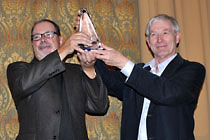News
Philip E. Bourne Wins Microsoft's 2010 Jim Gray eScience Award
Published October 14, 2010
|
Philip Bourne (left) joins Tony Hey at the 7th annual eScience Workshop to accept the Microsoft Research Jim Gray eScience Award. (Microsoft) |
Bourne is a professor with the Skaggs School of Pharmacy and Pharmaceutical Sciences at UC San Diego, as well as a distinguished scientist with the San Diego Supercomputer Center (SDSC) and an academic participant in the California Institute for Telecommunications and Information Technology (Calit2), both part of UC San Diego. Bourne received the award at Microsoft's eScience Workshop held in Berkeley, California, this week.
Bourne is also co-founder of SciVee, the Web 2.0 resource dedicated to the dissemination of scientific research and science-specific research networking. Launched in late 2007 as a collaboration between the National Science Foundation and SDSC, SciVee has been used by hundreds of thousands of students and professional scientists as a means of learning and sharing their research through online science videos that supplement peer-reviewed journal articles, stimulate discussion, and promote collaboration.
"Phil's contributions to open access in bioinformatics and computational biology are legion, and are exactly the sort of groundbreaking accomplishments in data-intensive science that we celebrate with the Jim Gray Award," said Tony Hey, corporate vice president of the External Research Division of Microsoft Research, in a corporate blog this week following the announcement. "In particular, Phil's role as the founding editor-in-chief of the open-access journal PLoS Computational Biology has significantly advanced open access in mathematical and computational biology."
The Jim Gray eScience award was established in 2008 as a tribute to Jim Gray, a Technical Fellow for Microsoft Research who disappeared at sea in 2007. Gray was intrigued by the explosive growth of data in modern science, and viewed the accumulation, organization, and utilization of this data deluge as the next step in the evolution of scientific exploration. He was dedicated to the idea that data-intensive computing would help solve some of society's greatest challenges.
"Jim defined data-intensive computing as a Fourth Paradigm in the evolution of scientific thinking. I am honored and humbled that our small efforts have been recognized in this way," said Bourne
Bourne is also the Associate Director of the RCSB Protein Data Bank (PDB), the single worldwide, open-access repository for three-dimensional structures of large molecules and nucleic acids. The PDB has more than 170,000 unique users per month, with more than 68,000 molecule structures archived to date. The RCSB PDB is jointly managed by Rutgers University, under director Helen M. Berman, and the Skaggs School of Pharmacy and Pharmaceutical Sciences at UC San Diego, with SDSC serving as the primary web and FTP site for users.
Bourne's research focus is on relevant biological and educational outcomes derived from computational science and scholarly communication, employing algorithms, text mining, machine learning, meta-languages, biological databases, and visualization to advance discovery in drug effects, evolution, cell signaling, apoptosis, and systems biology.
Bourne received his doctorate in 1980 from the Flinders University, South Australia. His other recent awards include 2009 Benjamin Franklin Award in recognition of his efforts as a leading advocate for the free and open dissemination of science and scientific data, the Flinders University Convocation Medal for Outstanding Achievement (2004), and the Sun Microsystems Convergence Award (2002).
About SDSC
As an Organized Research Unit of UC San Diego, SDSC is a national leader in creating and providing cyberinfrastructure for data-intensive research, and is celebrating its 25th anniversary this fall as one of the National Science Foundation's first supercomputer centers. Cyberinfrastructure refers to an accessible and integrated network of computer-based resources and expertise, focused on accelerating scientific inquiry and discovery. SDSC is a founding member of TeraGrid, the nation's largest open-access scientific discovery infrastructure.
Media Contacts:
Jan Zverina, SDSC Communications
858 534-5111 or
jzverina@sdsc.edu
Warren R. Froelich, SDSC Communications
858 822-3622 or
froelich@sdsc.edu
Categories
Archive
Related Links
San Diego Supercomputer Center: http://sdsc.edu
Bioinformatics Organization: http://www.bioinformatics.org
Jim Gray Award: http://research.microsoft.com/en-us/events/escience2010/jim_gray_award.aspx
RCSB Protein Data Bank: http://www.pdb.org
Calit2: http://www.calit2.net
UC San Diego: http://www.ucsd.edu


